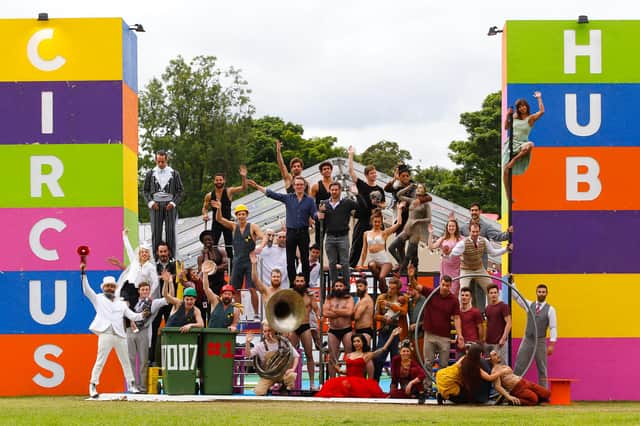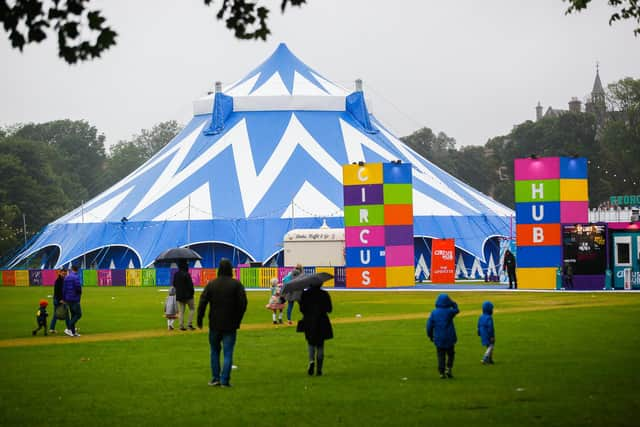Edinburgh Festival shows should not be seen as 'private' or 'commercial' events – Brian Ferguson


The French circus company Archaos were one of the biggest sensations at the Fringe in the late 1980s and early 1990s, thanks to their array of dazzlingly dangerous stunts.
But I’m not sure I had even heard of the event when I saw their show on Glasgow Green in 1990 during the city’s tenure as a European Capital of Culture.
Advertisement
Hide AdAdvertisement
Hide AdLeith Links was the home of Archaos in Edinburgh where the group’s production – which famously featured the juggling of chainsaws – wowed the critics and was named “the best show on the Fringe”. The company is still going strong in France, running the world’s biggest circus festival.
In recent years, Edinburgh has boasted its own dedicated circus venue, launched in 2015 by Underbelly, one of the biggest players of the Fringe’s modern era, to acclaim from the critics and round-the-clock crowds.
Six years later, Underbelly’s Circus Hub may seem something of an unlikely contender to become a Fringe battleground, particularly since it was previously occupied by the Ladyboys of Bangkok for 17 years.
But it has quickly become the focal point of what appears to be an ideological debate on the future of not just the Fringe, or the wider Edinburgh Festival, but the whole idea of culture, and where and how it should be enjoyed.
If all this seems a bit dramatic for the prospect of a circus big top being put up on the Meadows, the blog of the Cockburn Association, Edinburgh’s long-running heritage campaign group, is well worth venturing into.


Over the last year, when Edinburgh’s venues and events have been forced to close, it has taken an increasingly robust stance over the future of the festivals, calling for them to be decentralised and dispersed around the city.
It has also set itself firmly at odds with the Scottish government, the city council, the festivals and businesses by suggesting that they operate in an “echo chamber insulated from real engagement with civil society” and warning that they are dogged by a collective mindset comparable to the one which “drove RBS to disaster.”
In the run-up to the Holyrood elections, the Cockburn’s own manifesto demanded that access to public streets, parks and open spaces should always be “free and unrestricted” and asked candidates to end the “commodification and privatisation of Edinburgh’s cherished public spaces”.
Advertisement
Hide AdAdvertisement
Hide AdAs far as I can tell, ticketed cultural events of any nature seem to fall under this sweeping definition.
In an escalation of rhetoric, a social media campaign launched by the Cockburn Association has seen the Circus Hub’s shows rebranded as "commercial” “private”, “exclusive” or “hospitality” events.
In pre-Covid times, there were plenty events fitting those descriptions staged behind firmly closed doors in historic buildings across Edinburgh. But to apply them to Fringe shows open to all seems both ridiculous and deeply misleading.
There may well be grounds for debate over whether to continue staging Fringe shows on parkland sites.
But their critics should be prepared to focus on the key issues, including the length of time taken to repair them and whether that is a price worth paying for several weeks of live entertainment.
Nearly 75 years after the Edinburgh festivals were instigated in the aftermath of the Second World War to help bring nations across Europe together, it seems bizarre that the very notion of a cultural event for public enjoyment in the city should be up for debate.
It also suggests that a bit more reflection is needed by heritage enthusiasts on the cultural heritage of the city as it enters a crucial stage in its recovery.
A message from the Editor:
Thank you for reading this article. We're more reliant on your support than ever as the shift in consumer habits brought about by coronavirus impacts our advertisers.
If you haven't already, please consider supporting our trusted, fact-checked journalism by taking out a digital subscription.
Neil McIntosh
Editor
Comments
Want to join the conversation? Please or to comment on this article.
